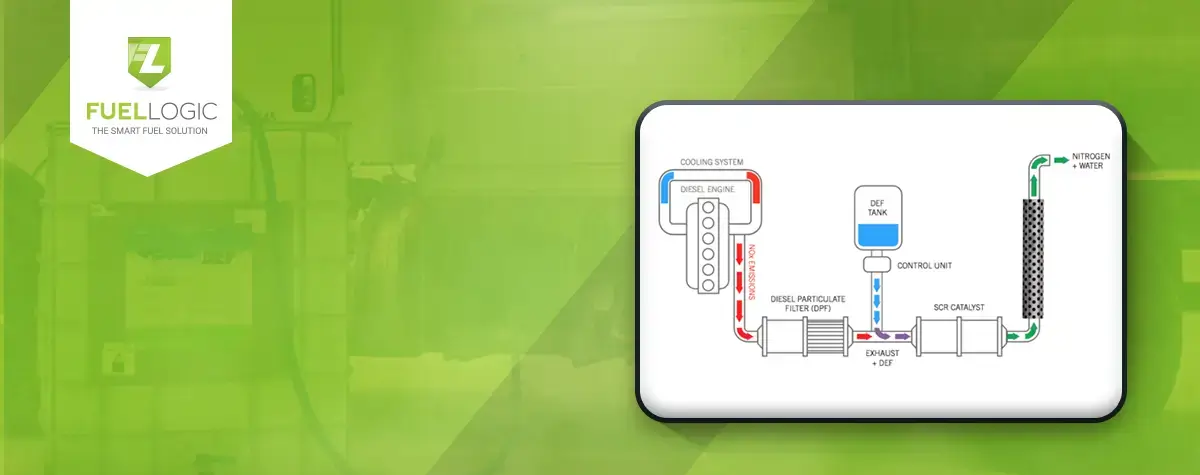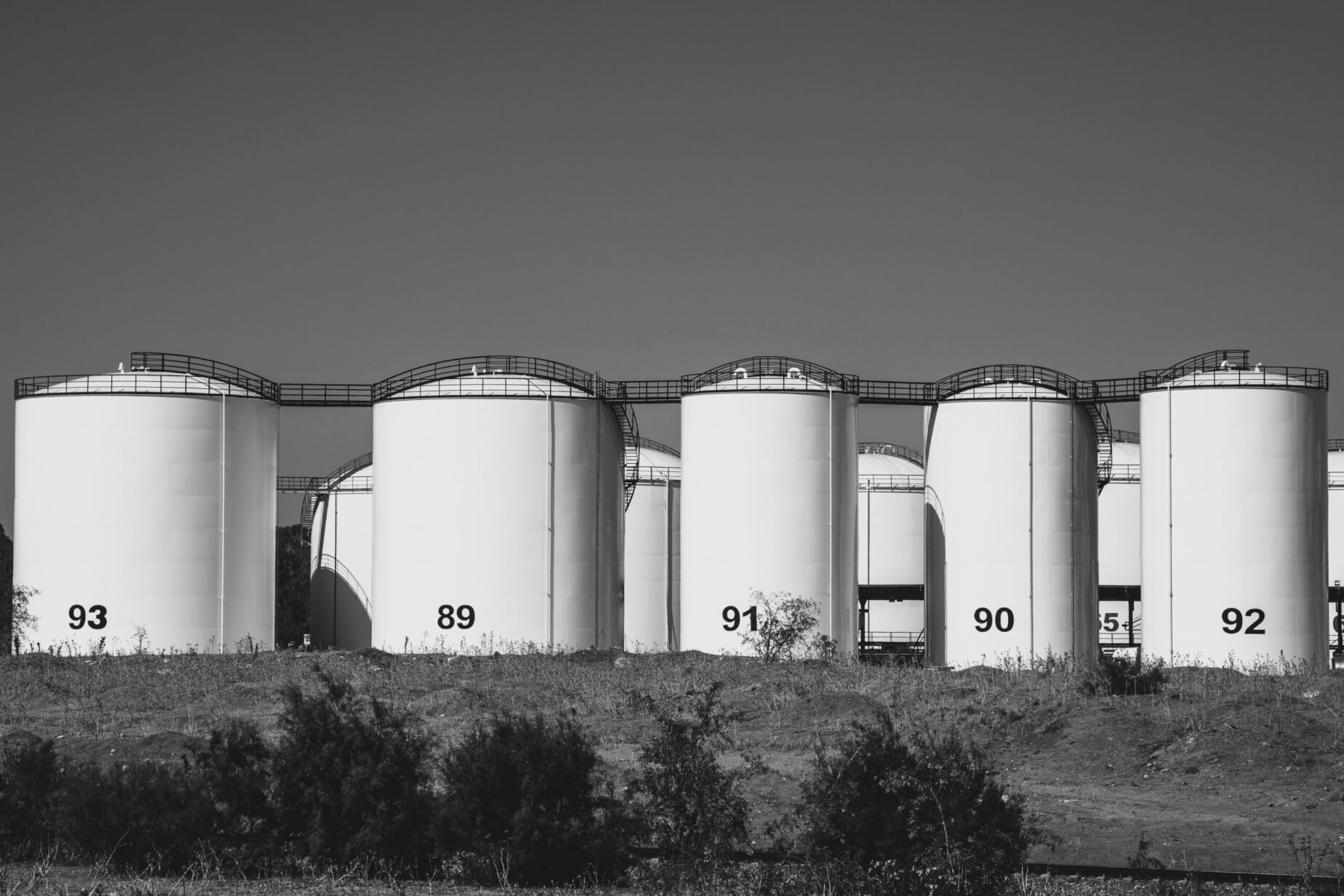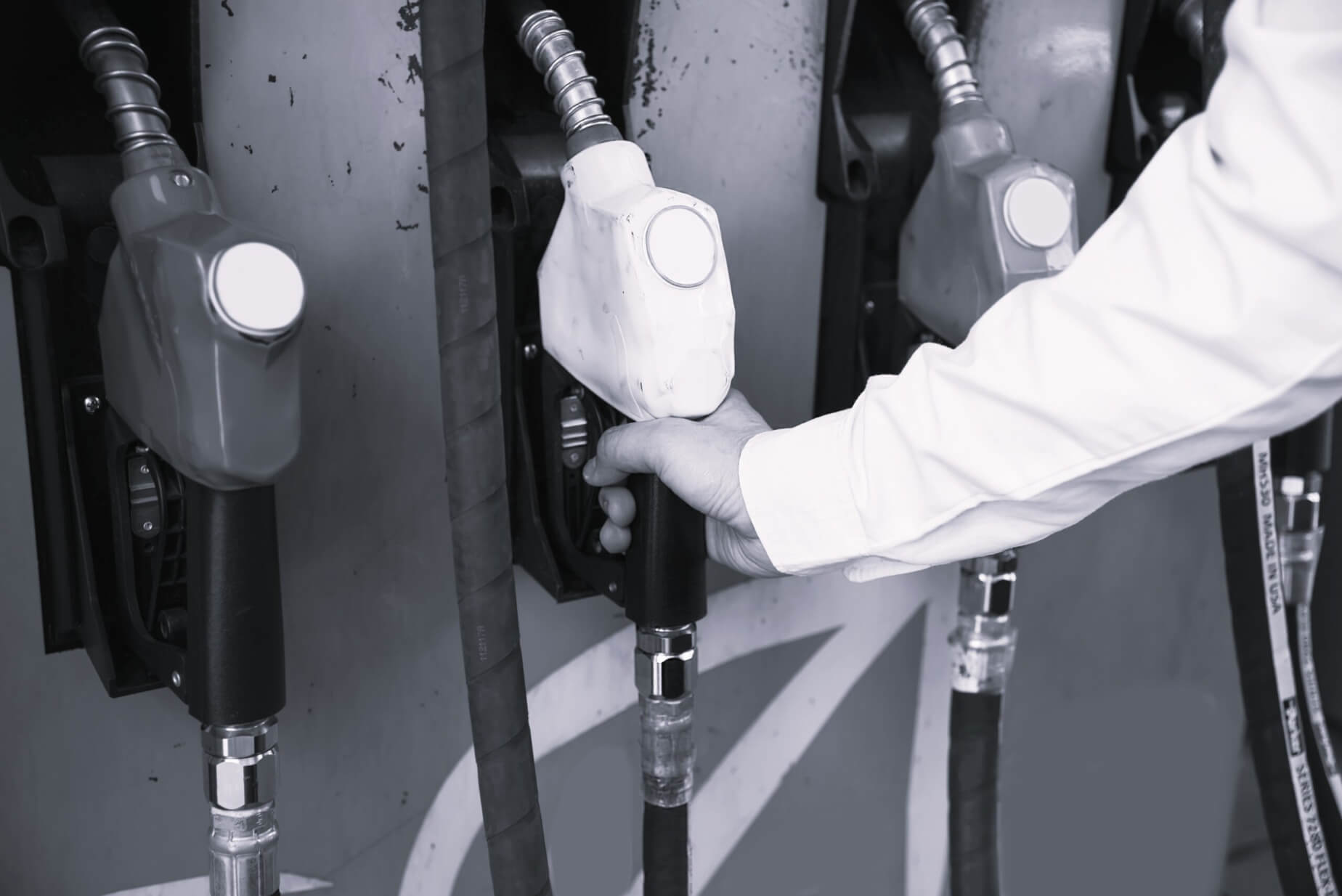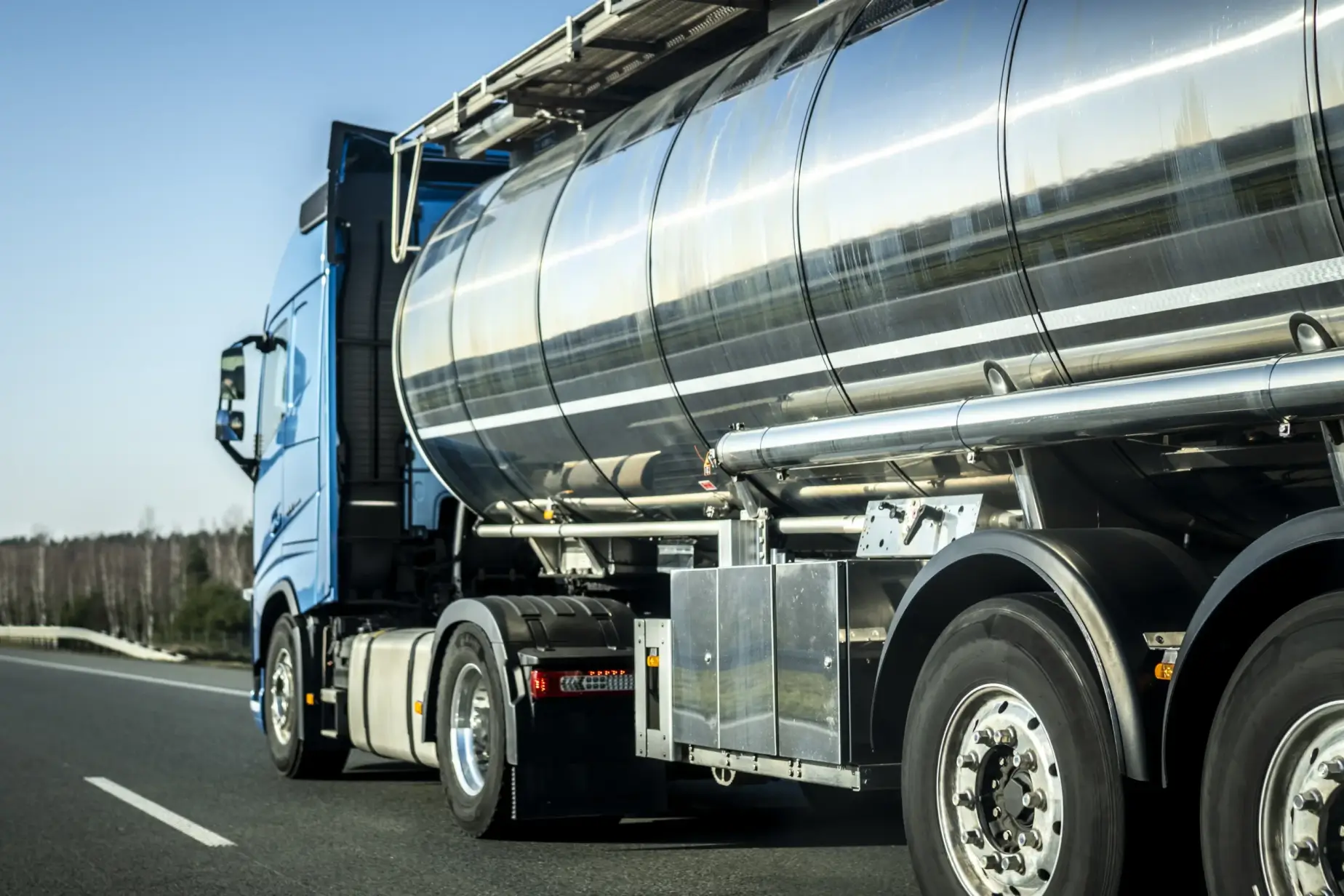TABLE OF CONTENTS
- The Role of Diesel Exhaust Fluid in Emission Reduction
- What is Diesel Exhaust Fluid (DEF) Fluid Made of?
- How Does DEF Fluid Work?
- Comparative Analysis: DEF in Diesel Engines vs. Petrol/Gasoline Engines
- Choosing the Right Diesel Exhaust Fluid (DEF)
- Refilling and Storage Tips
- Troubleshooting DEF-Related Issues
- FAQs (Frequently Asked Questions)
- 1. What happens to DEF if exposed to high temperatures?
- 2. How long does DEF fluid last?
- 3. How often do I need to add DEF fluid?
- 4. How do you know if DEF fluid is bad?
- 5. What happens if you don't use DEF fluid?
- 6. Is DEF a hazardous substance?
- 7. Does Diesel Exhaust Fluid (DEF) freeze?
- 8. Will DEF harm my aluminum tank?
- Conclusion
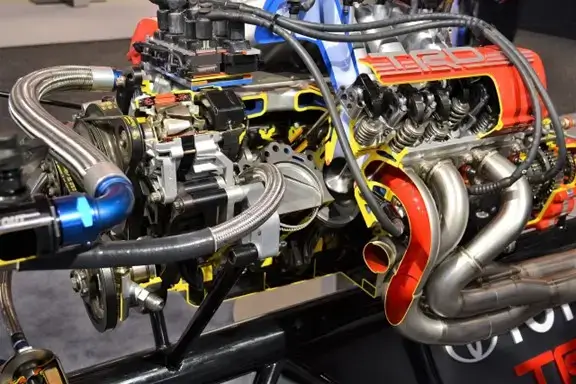
How does DEF fluid work is crucial in understanding the benefits it has for your vehicle. Its importance can be understood by its widespread adoption in the automotive industry’s efforts to produce cleaner and environmentally responsible vehicles.
DEF in diesel engines is largely driven by regulatory pressures aimed at mitigating the environmental impact of nitrogen oxides (NOx) emissions.
Governments may offer incentives for adopting cleaner technologies or impose penalties for non-compliance with emission standards. International agreements, such as the Kyoto Protocol and the Paris Agreement, further commit countries to reduce greenhouse gas emissions.
By reducing the formation of harmful pollutants in the exhaust system, DEF also contributes to extended engine life and reduced maintenance costs.
So, how does DEF work? And what benefits does it have for your vehicle?
The Role of Diesel Exhaust Fluid in Emission Reduction
Diesel Exhaust Fluid primarily reduces nitrogen oxides emissions in diesel engines through a process called Selective Catalytic Reduction.
In the presence of the catalyst, ammonia reacts with nitrogen oxides (NOx) in the exhaust gas. The reaction converts NOx into nitrogen (N₂) and water vapor (H₂O). These byproducts are harmless and inert gasses, making the exhaust emissions environmentally friendly.
The adoption of DEF in diesel engines stems from increasingly stringent environmental regulations imposed by governments worldwide. Research linking NOx emissions to respiratory diseases and other health problems has prompted regulatory bodies to prioritize NOx reduction in emissions.
The SCR technology, enabled by DEF, has become a vital component in meeting these regulatory pressures, helping achieve cleaner air and environmental sustainability.
What is Diesel Exhaust Fluid (DEF) Fluid Made of?
So, what is DEF fluid made of?
The fuel is essentially a solution composed of approximately 32.5% urea and 67.5% deionized water. Urea is a key component in DEF because it is essential for the Selective Catalytic Reduction (SCR) process.
When urea is injected into the hot exhaust stream, it undergoes thermal decomposition to produce ammonia (NH₃), a crucial reducing agent in the SCR catalyst.
Deionized water is used as the carrier for urea in DEF. It ensures that urea is adequately dissolved, forming a homogeneous solution.
The high water content helps lower the freezing point of DEF, preventing it from crystallizing in cold temperatures. This is crucial for ensuring the proper functioning of the DEF system in a variety of environmental conditions.
Now that we understand what is DEF, and its composition, the question of how DEF fluid works remains unanswered.
How Does DEF Fluid Work?
It’s true that DEF helps reduce harmful emissions from diesel exhaust engines, but how does the DEF system work?
The Science Behind Selective Catalytic Reduction (SCR) Technology
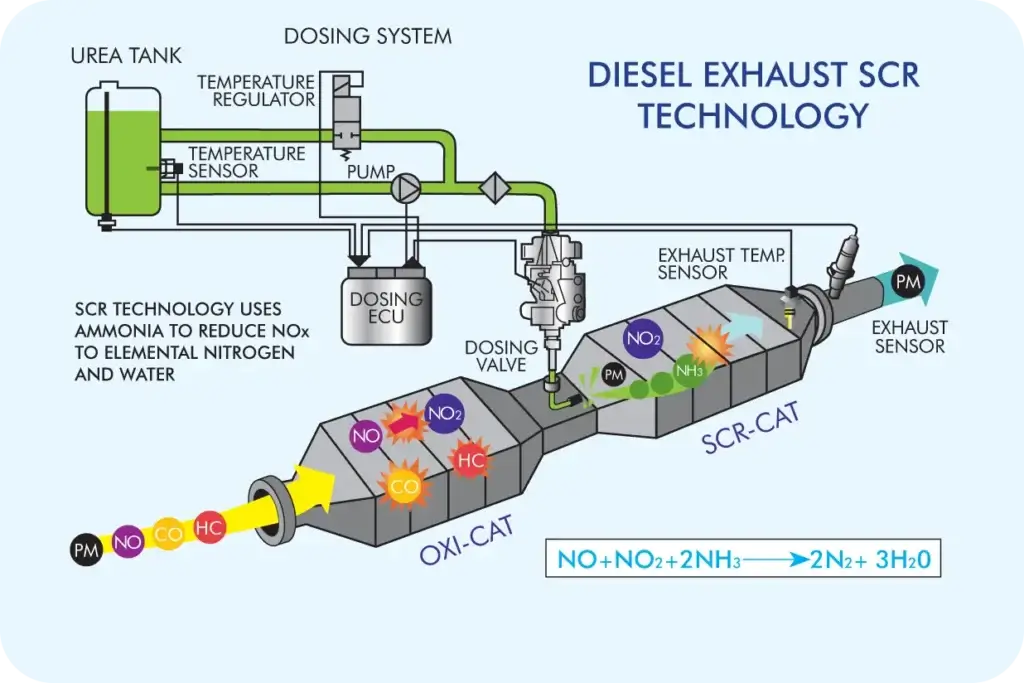
The answer lies in its pivotal role in the SCR process by providing the necessary ammonia to facilitate the reduction of nitrogen oxides in the exhaust gasses.
It is stored in a separate tank in the vehicle and injected into the hot exhaust stream before it reaches the diesel particulate filter. The high temperatures in the exhaust system cause the urea in DEF to undergo thermal decomposition, breaking down to ammonia (NH₃) and carbon dioxide (CO₂).
In the presence of the catalyst, ammonia reacts with nitrogen oxides (NOx) in the exhaust gas. The reaction converts NOx into nitrogen (N₂) and water vapor (H₂O).
DEF injection isn’t a ‘one-size-fits-all’ approach. The amount of DEF added to the exhaust stream actually varies based on a bunch of factors. Think of it like your car’s computer carefully calculating the perfect dose! It considers things like the engine’s temperature, how hard it’s working, and even the amount of harmful NOx emissions present. This ensures just the right amount of DEF is used to convert those emissions into harmless nitrogen and water vapor, keeping your engine running clean and efficiently.
Components of the SCR System
DEF is stored in a separate tank, which is equipped with level sensors to monitor the DEF fluid level. DEF injectors deliver the precise amount of DEF into the exhaust stream.
The injection occurs upstream of the selective catalytic reduction (SCR) catalyst.
When the engine is running, the engine control unit (ECU) determines the optimal amount of DEF required for NOx reduction based on inputs from NOx sensors.
NOx sensors are strategically placed in the exhaust system to monitor the concentration of nitrogen oxides. These sensors provide real-time feedback to the engine control unit (ECU) to optimize DEF injection for efficient NOx reduction.
The SCR catalyst is a crucial component made of materials such as titanium or vanadium. Exhaust gases pass through the catalyst, converting nitrogen oxides into harmless nitrogen and water vapor.
Environmental Benefits of DEF
The usage of DEF in diesel engines is a response to stringent environmental regulations set by organizations like the Environmental Protection Agency (EPA) and other regulatory bodies worldwide.
DEF must meet strict quality standards to ensure its effectiveness in reducing nitrogen oxide (NOx) emissions. Maintaining high purity and quality in the production process of DEF can increase costs.
The adoption of DEF in diesel engines has a significant positive environmental impact, by substantially reducing NOx emissions. NOx emissions, when released into the atmosphere, can contribute to the formation of acid rain and smog that have detrimental effects on ecosystems, water bodies, and soil quality.
Reduced air pollution from diesel engines also has a positive impact on vulnerable populations, including children, the elderly, and individuals with pre-existing health conditions.
Comparative Analysis: DEF in Diesel Engines vs. Petrol/Gasoline Engines
Diesel and petrol engines differ in their combustion processes and, consequently, their emission profiles. Diesel engines tend to produce higher levels of nitrogen oxides (NOx) and particulate matter, while petrol or gasoline engines typically emit more carbon monoxide (CO) and hydrocarbons (HC).
Petrol engines commonly use catalytic converters to reduce CO, HC, and NOx emissions. These devices effectively convert these pollutants into less harmful substances.
The Selective Catalytic Reduction (SCR) technology, facilitated by DEF, is particularly effective in reducing NOx emissions. Diesel engines, with their higher NOx output, benefit significantly from this technology.
While both types of engines employ various technologies to reduce emissions, the distinct combustion characteristics of diesel engines make DEF a crucial component for achieving cleaner and more environmentally friendly diesel engine operation.
Choosing the Right Diesel Exhaust Fluid (DEF)
Choosing the right DEF is a crucial requirement for your vehicle. A high-quality DEF should adhere to industry standards and certifications to ensure its effectiveness. Certifications like the American Petroleum Institute (API) certification and compliance with the ISO 22241 standard are essential benchmarks.
Impurities or contaminants in low-quality DEF can lead to deposits and fouling in the SCR catalyst, potentially causing damage to the system.
Different vehicle manufacturers may have specific requirements for DEF to ensure compatibility with their engines and emission control systems, so choose a DEF fluid that aligns with your specific vehicle needs.
If you have chosen a DEF fluid brand to cater to your vehicle requirements, there are some things you need to check before buying bulk DEF.
Refilling and Storage Tips
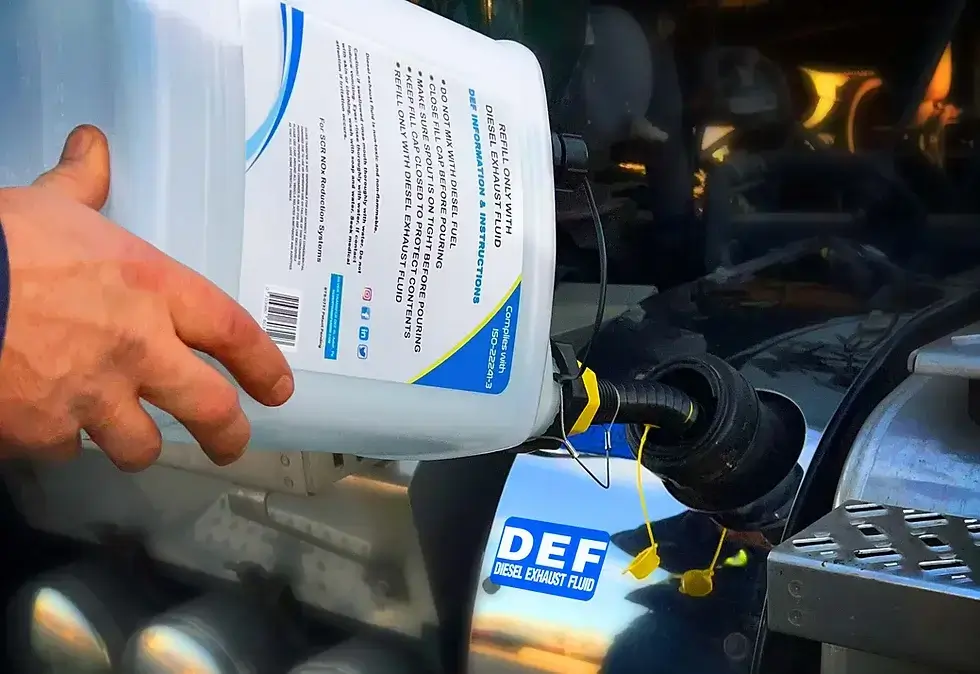
Refilling the Diesel Exhaust Fluid (DEF) tank is straightforward, but proper procedures are crucial to ensure safety, effectiveness, and the prevention of common mistakes.
Here are some tips for refilling DEF:
- Be familiar with the location of the DEF tank. Avoid confusion with the diesel fuel tank, which can lead to incorrect filling.
- Use dedicated equipment, such as a DEF nozzle, to avoid cross-contamination with diesel fuel.
- Never mix DEF with other fluids, as this can compromise its purity and effectiveness.
- Wear appropriate personal protective equipment, such as gloves and safety glasses, when handling DEF.
Storing DEF also requires specific conditions, where the temperature needs to be maintained between 12°F and 86°F (-11°C to 30°C) to maintain its effectiveness. Keep it away from direct sunlight, as that can degrade the quality of DEF over time.
DEF may freeze in extremely cold conditions. However, it thaws without any loss of quality or effectiveness.
In hotter temperatures. DEF may evaporate more quickly. Proper storage and handling practices, such as keeping containers sealed and shaded, help mitigate these effects.
Troubleshooting DEF-Related Issues
How does DEF fluid work, and how do you ensure it keeps working properly?
Well, there are a bunch of common issues that can occur in the DEF system from time to time.
Warning lights may indicate such issues, as well as reduced power, increased fuel consumption, and abnormal exhaust emissions.
To troubleshoot these signs:
- Ensure the DEF tank has an adequate supply.
- Check DEF for impurities or contamination.
- Examine the DEF tank, hoses, and injectors for physical damage or leaks.
- Check the vehicle’s diagnostics system for error codes and refer to the manual for interpretation.
Scheduling regular maintenance checks, keeping the DEF tank and equipment clean, and adhering to the manufacturer’s recommendations for DEF usage, storage, and handling can prevent these issues from occurring.
FAQs (Frequently Asked Questions)
1. What happens to DEF if exposed to high temperatures?
If Diesel Exhaust Fluid (DEF) is exposed to high temperatures, it may evaporate more quickly. To maintain its quality and effectiveness, it’s advisable to store DEF in a temperature range of 12°F to 86°F (-11°C to 30°C) and protect it from direct sunlight.
2. How long does DEF fluid last?
DEF’s shelf life is influenced by storage conditions. Under ideal conditions (cool and shaded), DEF can last up to two years. However, it’s recommended to use DEF within one year to ensure optimal quality and performance.
3. How often do I need to add DEF fluid?
The frequency of adding DEF fluid depends on your vehicle’s usage and the size of the DEF tank. Modern diesel vehicles typically have sensors that monitor DEF levels, and a warning light will indicate when it’s time to refill. On average, DEF consumption is roughly 2-3% of diesel fuel consumption.
4. How do you know if DEF fluid is bad?
Signs of bad DEF include discoloration, foul odor, or the presence of impurities. If DEF appears yellowish or has particles, it may be compromised.
5. What happens if you don’t use DEF fluid?
Diesel engines equipped with Selective Catalytic Reduction (SCR) systems require DEF to reduce nitrogen oxide (NOx) emissions. If you don’t use DEF fluid, the SCR system won’t function properly, leading to increased emissions and potential non-compliance with environmental regulations.
6. Is DEF a hazardous substance?
No, DEF is not a hazardous substance. It is non-toxic, non-flammable, and safe to handle. However, it’s essential to follow recommended handling practices, wear appropriate protective equipment, and prevent contamination.
7. Does Diesel Exhaust Fluid (DEF) freeze?
Yes, DEF can freeze at temperatures below 12°F (-11°C). However, it doesn’t affect its quality. When thawed, DEF retains its original properties, and its effectiveness is not compromised.
8. Will DEF harm my aluminum tank?
DEF is generally compatible with materials like aluminum. However, it’s crucial to use a tank and dispensing equipment specifically designed for DEF to prevent any potential reactions or damage.
Conclusion
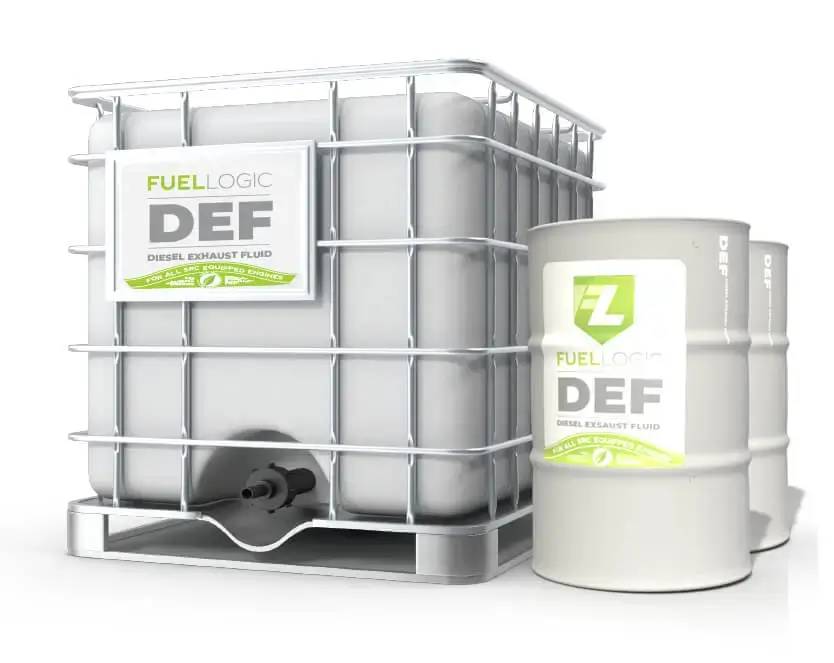
DEF is instrumental in mitigating NOx emissions, promoting environmental compliance, and enhancing diesel engine air quality. It is a key component in reducing harmful nitrogen oxide (NOx) emissions, contributing to cleaner and more environmentally friendly diesel engine operation.
The SCR technology enabled by DEF ensures that diesel engines comply with emission standards, contributing to a sustainable and eco-friendly approach.
Proper DEF usage ensures that the SCR catalyst remains effective in converting NOx emissions, maintaining the efficiency of the emission control system.
Searching for convenient DEF delivery services? Look no further!
Whether you’re in need of bulk DEF delivery near you or simply want to streamline your DEF orders, we’ve got you covered. Our hassle-free solutions and advance fleet management ensure that you receive your Diesel Exhaust Fluid promptly and efficiently.
With our commitment to reliability and customer satisfaction, you can trust us for all your DEF and your mobile fleet fueling needs.
Contact us now to schedule your delivery and experience the convenience firsthand!

